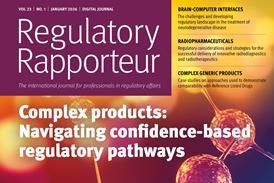
Regulatory Rapporteur
April 2024 | Volume 21 | No.4

Data, the focus topic for this month’s journal, brings together a range of articles which are underpinned by one uniting factor: our absolute dependence on it. Perhaps, philosophically, without data we do not exist. Quality, safety and efficacy are the fundamental pillars of our profession. We collect and present data in medical research and medical treatments to meet the needs of our customers, patients, regulators, payers and our clients and companies. How we demonstrate that the quality, safety and efficacy fundamentals are delivered from the lab bench to the marketplace is critical to our common goal.
Every day, we make decisions based on learning, regulations and guidelines. We are surrounded by many forms of information and data is the fundamental unit. The data and the inferences and decisions we make from it depend on the quality we receive. High-quality data is essential for accurate and reliable decision-making. Poor data quality can lead to errors, delays and inefficiencies in various business processes. It is crucial for organisations to ensure data quality to meet regulatory requirements, avoid legal issues and maintain stakeholder trust. Investing in data quality management can prevent costly consequences and optimise operations.
Challenges arise when there is a lack of robust data management, and these challenges suggest a need to develop data-driven approaches for successful submissions and reviews. We could fill a library with the many ways in which the volume and quality of data affects our lives. The articles in this month’s journal offer up a window into how data affects our work today and a glimpse into the future.
Fiona Maini et al take us on a journey through the scientific and technological advancements transforming clinical trials through digitisation and innovation. This has led to an increase in the volume, velocity and variety of data, requiring modern and robust data management practices. The critical question is how industry and regulators adapt to this new data normal? Proactive management of associated risks will help our customers accept and trust the data.
The incorporation of artificial intelligence (AI) into the regulatory industry is a significant development that accelerates drug development and revolutionises the handling and interpretation of data. In our article on AI, by Baily Thomas and colleagues, we see that it requires high-quality data to learn and provide valuable insights. It offers tools to clarify and even reveal information that could be lost in the volume of data generated. Standards for data quality and collaborative efforts in regulatory frameworks are essential to ensure the accurate and ethical use of AI in the industry.
Combination products can help with compliance and better targeting and delivery of medical therapies. However, along with these benefits comes the need for clear demonstration of the benefits. And so, again, data quality is the key. Ola Oyinloye highlights the impact of data-driven approaches on device submissions for combination products. Managing data for such submissions can be challenging for many reasons but undoubtably due to the complexity and volume of information involved. Ensuring data quality and consistency is crucial in demonstrating the safety, efficacy and quality of combination products.

Further exploring the process of global convergence of data standards, a large team of authors from Syneos Health led by Ratnam Tammineedi, consider the issues around navigating the future of medicinal product data exchange and understanding the crucial role of eXtended EudraVigilance Medicinal Product Dictionary – the XEVMPD. Their article focuses on the current process followed for XEVMPD submissions and its future transition to ISO IDMP standards. It also recognises the importance of the comprehensive data retained within XEVMPD to not only facilitate compliance with regulatory requirements but also act as a basis for bolstering pharmacovigilance.
Having the right information and understanding to make decisions is critical and the article on China’s drug master file (DMF) registration pathways provides us with a deeper understanding of the intricacies involved. April Wang examines and presents the available options for DMF registration in China, focusing on active pharmaceutical ingredients, excipients and packaging materials. The goal is to empower DMF applicants with knowledge to optimise their registration processes within China’s regulatory environment. Staying up-to-date and making well-informed decisions is crucial in DMF registration in China.
Asthma is a complex disease with varied symptoms and challenges in developing new treatments. Peter Kielty et al conduct a review of European Public Assessment Reports (EPARs) and literature on the effects of COVID-19 on asthma exacerbations which identified key areas of risk in clinical trials, including standard of care, patient characteristics, pharmacokinetics/pharmacodynamics, clinical endpoints and protocol design. Considering novel endpoints and alternative trial designs can enhance the clinical development of asthma treatments. The decline in severe asthma exacerbations during the COVID-19 pandemic further emphasises the need for innovative approaches in clinical trials.
In conclusion, ensuring quality, safety and efficacy in medical research and treatment requires robust data management practices. The evolving landscape demands data-driven approaches for successful submissions and reviews. Proactive management of risks, investment in data quality management and adaptation to technological advancements are crucial in meeting regulatory requirements and driving efficient and effective drug development processes.
































